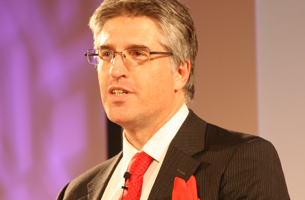Whatever Takeda learned about MacroGenics in the four months since it signed an option pact that included $33 million in an upfront and early milestone, along with $468 million in add-on incentives, the experience must have been rewarding. The Japanese pharma company has come back for more, agreeing to pay the freight on researching up to four more programs while adding up to $400 million each--$1.6 billion in total--in fresh milestones.
 |
| Tetsuyuki Maruyama, general manager of the Pharmaceutical Research Division at Takeda--Courtesy of Takeda |
Takeda stepped up to grab an option on Rockville, MD-based MacroGenics' ($MGNX) MGD010 last spring. This latest deal represents the biotech's sixth big partnership, with Gilead ($GILD), Servier, Boehringer Ingelheim and others all on the line for development deals with some big back-end numbers built in. And this time MacroGenics is keeping an option to pay part of the Phase III costs in exchange for a share of the profits following potential approvals.
MacroGenics, a 2013 Fierce 15 company, has been attracting attention for its bispecific antibody efforts, tackling two targets with one therapy. MacroGenics focuses on autoimmune diseases as well as cancer. CEO Scott Koenig did a stint as senior VP in R&D at MedImmune prior to joining the company.
The company went public last fall with a popular IPO and now has a market cap of $555 million and a stock price that closed Monday a penny north of $20 a share.
MacroGenics has been growing steadily. Its staff has swelled from 165 at the IPO to about 200 now, and Koenig tells FierceBiotech that there's room for more partnerships on the company's broad tech platform for bispecifics.
MacroGenics has fully bounced back from a big setback it experienced in 2010, when Eli Lilly ($LLY) wrote off a big partnership for teplizumab for Type 1 diabetes after a late-stage failure. The investigators behind that drug, though, never gave up, and the company has been scouting for a fresh deal after the program was restructured and a recent study came back with positive data.
Koenig adds that teplizumab is now in a Phase II for delaying or preventing diabetes which will run for several years, with a partnership possible for Phase III development.
"The breadth of our alliance with MacroGenics underscores our confidence in their research and development capabilities, as well as the robustness and versatility of their bispecific DART platform," said Tetsuyuki Maruyama, general manager of the Pharmaceutical Research Division at Takeda, in a release.
- read the release
Special Report: FierceBiotech's 2013 Fierce 15 - MacroGenics